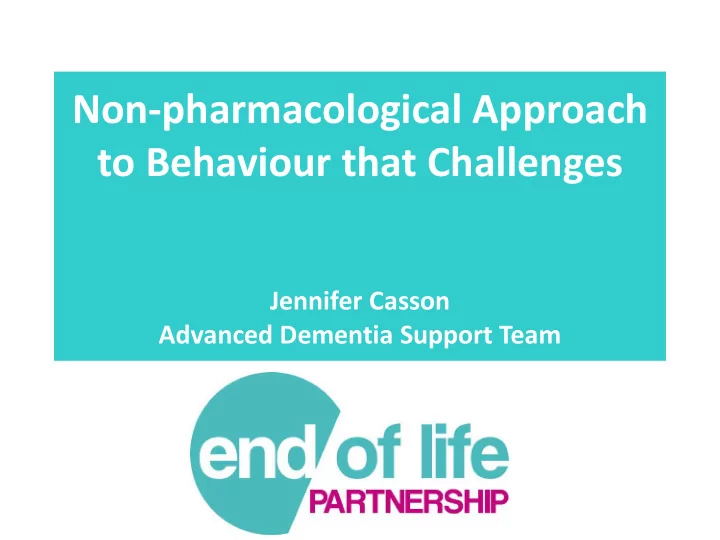

Non-pharmacological Approach to Behaviour that Challenges Jennifer Casson Advanced Dementia Support Team
Jennifer Casson Advanced Dementia Support Team
% ? • Dementia is the biggest health problem facing older people today 52 % • ‘Dementia affects physical aspects of a person’s health’ 74 % • ‘ Dementia affects mental aspects of a person’s health’ 93 % (Alzheimer’s Research UK)
2/3 -> 4/5 • Apathy: 50 – 70% Associated with • Agitation: 20 – 60% • caregiver burden • Depression or anxiety: • Institutionalisation 40% • worse prognosis • Psychotic symptoms 25% • rapid rate of illness progression Ballard C, Howard R (2006) • high direct and indirect costs of care Lawlor, B. (2002) BJ Psych
defined as any behaviour that is unpredictable, frequent, of long duration and is distressing to the individual or a nuisance to others (Tarbuck and Thompson, 1995)
Agitated behaviour as ‘socially inappropriate’ • abusive or aggressive toward self or other • appropriate but with inappropriate frequency • socially inappropriate (Cohen-Mansfield, Marx, and Rosenthal, 1989)
UCLA Gary Small
The limbic system
Brain atrophy = brain failure
Erik Erikson & Naomi Feil
Unresolved conflict Eight Stages Validation Theory Hope: Trust v Mistrust unresolved life issues Will: Autonomy v Shame • Mal-orientation Purpose: Initiative v Guilt Competence: Industry v Inferiority • Time confusion Fidelity: Identity v Role Confusion Love: Intimacy v Isolation • Repetitive motion Care: Generativity v • Vegetation Stagnation Wisdom: Ego Integrity v Despair
‘Tom Kitwood ’ Malignant social psychology An ‘enriched’ model Person-centred dementia care
Unmet needs… Which is it? Comfort? Inclusion? Identity? Attachment? Occupation?
Cohen-Mansfield & James
Life History Triggers to unwanted behaviour Personality Intervention ideas 1,2,3 Social environment Other needs Physical health Medication
Teepa Snow N.V.C P.A.C
1. Remove the threat 2. Create space 3. Be on her side 4. Get at on or below eye level peak intense behaviour 5. Use hand-under-hand 6. Breathe in sync emotions accelerate de-escalation 7. Calm voice agitation rises here 8. Relax the body 9. Attend to need 10.Be willing TRIGGER! recovery calm
Final thoughts • Take a step back if you can • Be person-centred • Use your full tool-kit
Would you like to get in touch? • jenny.casson@eolp.org.uk • www.eolp.co.uk/ • www.cheshire-epaige.nhs.uk/
Recommend
More recommend